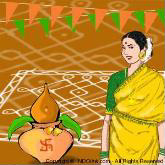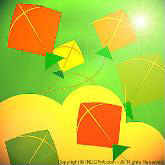Balagokulam Guide
Festivals
Biographies
Hindu Dharma
Other Topics
Sangh Prarthana
Ekata Mantra
Shlokas
Bhajans
Sangh Geet
Skits
|
|
(Usually on January 14th or 15th)
In Samskrit language, 'Kranti' means change and 'Sankranti' means good change.
 It is celebrated on this day because of the positive change in the nature at this time. The Sun enters the sign of Makara or Capricorn. From this day, the duration of day increases and that of night decreases. Light symbolizes knowledge, and brighter aspects in our lives and darkness represent ignorance and duller aspects. Thus 'Sankranti' signifies this positive change of increasing the good qualities in us and decreasing the negative ones.
It is celebrated on this day because of the positive change in the nature at this time. The Sun enters the sign of Makara or Capricorn. From this day, the duration of day increases and that of night decreases. Light symbolizes knowledge, and brighter aspects in our lives and darkness represent ignorance and duller aspects. Thus 'Sankranti' signifies this positive change of increasing the good qualities in us and decreasing the negative ones.
This also marks the celebration of harvesting season. This happy occasion is termed as Pongal in southern Bharat and as Khichadi in northern Bharat - both of them being names of delicacies specially prepared on that day!
In many parts of Bharat there is a tradition of special art called Rangoli, which is drawn during this festival season. This art is done in front of the house with the Rice flour and colors.
 Flying Kites is during this festival. There are competitions held in Kite flying. Flying Kites is during this festival. There are competitions held in Kite flying.
In many areas of Bharat, this is symbolized by the distribution of til-gul - the sesame seed and jaggery. The til, brimming with fragrant and delicious oil, stands for friendship and bonding and jaggery for the sweetness of speech and behavior. People exchange til-gul and wish that every one speak sweet words.
The biggest Mela - religious fair - on the face of the earth is held once in twelve years at Prayaag, the holy confluence of rivers Ganga, Yamuna and the invisible Saraswati.
In short, Makara Sankramana embodies the ardent prayer of every Hindu heart :
Asato maa sadgamaya
Tamaso maa jyotirgamaya
Mrityoormaa amritam gamaya
Lead me, O Bhagawan, from untruth to Truth, from darkness to Light and from death to Immortality.
Back to Festivals
Go to top
|
|

